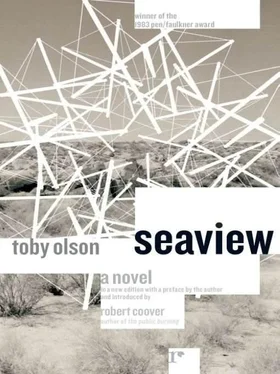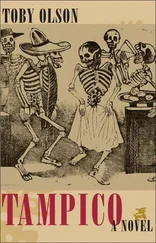From the direction of the lighthouse and the distant side of the golf course, where they could not see, they could hear only the muffled sounds of motors, some voices raised in command, and the creak of machinery. Allen reached in his bag and fingered through the club heads until he felt his three-iron and pulled it free. He got up, slinging the bag over his shoulder as he rose. He had the iron in his left hand, and he reached down with his right, took Melinda’s arm, and helped her to her feet. She staggered a little, but he held her while she steadied.
“You get in front,” he said. He got her there, and put his hand in the middle of her back, his arm out stiff. He used his three-iron as an awkward staff, and he pushed what strength he could into her, leaning forward, so that she could make it uphill. They went in tight little zigs and zags in order to cut down the steepness of the incline. They kept their heads down in their effort. Allen glanced up occasionally in order to steer them. With less effort and time spent than he had anticipated, they came to the wet, stone base of the small tower.
RICHARD’S INTENTION WAS TO KILL HIM ON THE EIGHTH green. He had seen that the eighth was set no more than a hundred feet from the public road that ran parallel to the high, jagged cliff, the golf course between it and the sea. The eighth was also set down in a shallow valley protected from wind, and the rough that ran from behind the green and continued all the way to the road was almost a forest. The pines in it were high and straight and very dense, and they started very close to the green’s back, just beyond the sand trap behind it. He had seen him and his wife and the other three at the first tee through his binoculars, from where he stood against the car at the lighthouse parking lot, and he figured he had close to two hours, safely an hour and a half. He would get Gerry and something to eat, then he would come back and wait for them. The road to the lighthouse was crowded with walkers heading for the beach, and it had taken him a while to get past the clubhouse and away from the course.
When he got back to their motel room, Gerry had their things packed and ready in the way he had told her to. He told her to get in the car, and he took her to a drive-in on the highway where they got some food. On the way he told her that she was to keep quiet and stay in the car and that, if she was good, he would find a good way later of giving her something she would like. When he got to the road that headed to the golf course, an hour and a quarter had passed, and as he came to the turn toward the lighthouse, he could see something was going on and that his plans might have to change.
He passed a policeman standing beside a motorcycle near the place where he had intended to enter the pines on foot. Up ahead, he saw a cruiser blocking the mouth of the lighthouse road. Some people were standing around on the road, but the land sloped up from there, and little could be seen in the direction of the course and the sea. He slowed but did not stop, passing the lighthouse cutoff.
“What’s happening, Richard?” she said in the seat by the door.
“Just shut up and sit there,” he said.
He continued along, west of the course, until he passed the entrance of a campground and came to the road that moved off left, at an angle, to the Air Force Station, and then he stopped the car. He could see that the Air Force road ran along the downcoast edge of the golf course. Above the ascending road, up and to the right of it, he could see the three white domes. To the left, and also well up and toward the sea, he saw the parapet of the stone tower. There was a sign, marked government property, authorized vehicles only, at the mouth of the road, and a short way up it, at a turn, he could see the nose of a green military truck sticking out. Two men in uniform, with rifles in their hands, stood in front of the truck. He turned the car around and went back to the campground. When he got there, he parked in front of a small building near the road. The building was white cinder block, and it had a sign above the door, marked office. He went in. Gerry stayed in the car. In a few minutes he came out with a paper in his hand and a canvas packet under his arm. He got into the car and checked the simple numbered map on the paper. Then he drove around the building and entered the open meadow behind it.
There were a number of campers and tents, and as he entered the central dirt carpath that ran down the middle between them, he saw short sticks with numbers on them and the spokes of driving paths moving off to both sides. He turned at the second spoke, driving very slowly; when he came to number forty-three he stopped the car and got out.
The meadow was about three hundred yards deep, from the road to the hill that started up toward the golf course. He could see there were a good number of men in military dress lining the perimeter between the meadow and the course. Some of them had weapons slung over their shoulders, and some had sidearms. A number of the campers were milling around along the line, talking and looking up the hill behind it. There was smoke rising in the air in places from beyond the hill. The rain and the uniform and heavy cloud cover had begun to move off. It was still cloudy, but there was some hazy sun in places brightening the day a bit. He turned and looked over to the right and behind him. There was a low white building, the back of which came up close to the pines that covered the hill running between the campground and the Air Force Station road. The sign on the front of the building read: showers/men .
He told Gerry to get out of the car and help him. The tent was small, a one-man pup, and they got it up quickly. They took what they could find out of the trunk of the car, making the camp appear serious. Then he told her to get back in the car and wait. He told her she could get in the tent when she wanted to, but that the car and the tent were her only two places. He smiled at her, tightlipped, giving her the rules. The tent was very small and uninviting. He got his blue robe out of his suitcase and his shaving kit. Then he got in the tent, took off his shoes and socks and rolled them in the towel he had with him. He rolled his pants to the knee. When he was ready, he got out of the tent and headed over to the white building in his robe. When he got in, he checked the stalls to see no one inside of them. The place was empty, and he figured they were all outside, checking the military action. He went to the screened window at the back of the building, raised it, and with the heels of both hands knocked the screen out. He put his shoes and socks on and made a bundle of his robe and towel and shaving kit. Then he got through the window, dropped to the ground, and stepped into the pines.
He headed up through the trees in the direction of the sea, passing to the right of the line of Air Force men. It took him a good ten minutes to reach the crest of the ridge. When he got there he looked down and saw the second fairway. He could see the green and the dark object on it, though he could not identify it. He saw the golf cart turned on its side to the right of the green in the low rough. Above him, up the ridge in the pines to his right, he could see the top of the stone tower. He took his binoculars out of his shaving kit and trained them on it. He saw Allen, his head and shoulders visible, at the parapet, standing still and looking out. Allen seemed to be alone, his wife nowhere in evidence. He dropped his kit and towel and robe in the brush. He checked his pistol and shoved it down in his belt. Then he headed up and along the ridge. He was starting to buzz a little, and he would have liked to hurry. But the pines were thick, forcing a slow pace. He figured it would take him a good twenty minutes to get there.
Читать дальше












